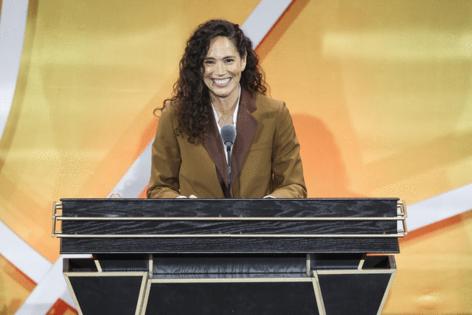Dom Amore: UConn's Maya Moore, Sue Bird, speak on belonging, connection in Hall of Fame induction
Published in Basketball
SPRINGFIELD, Mass. — Their speeches were long enough, short enough, just right for the night. Their pitch was perfect, and most important, their themes were universal.
“Championship culture can be found not just in sports, but in all aspects of life,” Maya Moore told the crowd of 2,600 at Symphony Hall. “In our homes, our schools, our neighborhoods, those are the true measures of how our winning legacy exists.”
Moore and Sue Bird, two who grew and emerged from the UConn women’s basketball dynasty and went on to conquer the global community of their sport, now belong to the community of all-time greats, with their enshrinement in the Naismith Hall of Fame Saturday night.
“For me, the Hall of Fame is the ultimate capstone, not because of the fame part, but because of the hall part,” Bird said. “It’s about being forever connected to this group of peers. The real honor is becoming part of a community that includes everyone. This honor really boils down to one word that Maya, Sylvia (Fowles) and I know doesn’t come easy, especially in the career of a female athlete: belonging.”
Connecting and belonging were the themes for Moore, who spoke for 8 1/2 minutes, and Bird, who spoke for 12 1/2, as their college coach, Geno Auriemma, and fellow Husky already in the Hall, Swin Cash, sat on the high chairs on stage to their right. Like their fellow enshrinees, they talked about their long basketball journeys, the obstacles, the doubters, the growth, but they put those journeys in the larger perspective. During their time, women’s sports, particularly basketball, grew exponentially in terms of connecting to and belonging in the consciousness of mainstream sports.
Moore, 36, who played on two championship teams at UConn, four in the WNBA with Minnesota, won two Olympic Gold Medals with USA basketball, and more championships overseas, retired from basketball at age 29 to pursue goals in social justice and criminal justice reform. She helped to free her future husband, Jonathan Irons, who sat smiling proudly as she spoke, from incarceration 23 years after he was wrongly convicted of a 1998 crime.
“After 20 years of competing for championships, I learned that so much of the work needed to create championship culture is actually hidden,” Moore said. “For my teams that looked like hidden hours on the court together. Likewise, much of the work of building championship communities is unseen, the internal work we have to do to realize we are all teammates on this planet, discovering the neighbors around us we have always overlooked, showing up to learn and listen to people who have different perspectives than our own, figuring out how we can all get our needs met and not be at the expense of someone else’s dignity.”
Bird, 44, from Long Island, played soccer on a boys team because there were no teams for girls in her area. By the time she got to high school in the mid-1990s, girls basketball was growing. She joined UConn three years after its big breakthrough, the first championship in 1995, and help create the perennial championship contenders with the two titles she helped win. Bird also won four WNBA titles with Seattle, where she played 21 years and became a sports icon in a city with NFL, MLB, and NBA franchises when she got there, an NHL franchise by the time she retired. Earlier this summer, a statue of her was unveiled outside the Storm’s arena.
In sports culture, nothing says “belonging” like bronze.
“The odds of becoming a professional soccer player, let alone a basketball player, were stacked against me,” Bird said. “There was no professional path, no professional league, no obvious place for someone like me. But at every phase, there were people who made sure I knew I had a place in basketball, and that’s how basketball became my home.”
After rising from a local CYO team to AAU basketball, “I had found my fit,” Bird said.
The community of UConn Hall of Famers includes Auriemma, Rebecca Lobo, Cash and now Bird and Moore, with several more assured to follow. The UConn program was instrumental in growing interest and acceptance for women’s basketball, and the state played an outsized role in saving the professional league, the WNBA, by rescuing the failed Orlando franchise for $10 million and making it profitable at Mohegan Sun. There are multiple offers of more than $300 million vying to own that franchise now, a refection of growing TV ratings and attendance. From franchise folding to being fought over, that the basketball impact Bird, Moore and fellow inductee Fowles carried with them to Springfield.
“How do you like them apples?” Bird said, channeling the movie "Good Will Hunting."
Halls of Fame is for those who played or coached their sports with great distinction. Within them, there are a select few who pulled their sport out of the shadows, out of small, passionate pockets like Connecticut to make it global. Bird and Moore helped make women’s basketball belong, helped make it part of the world community. Induction officially made Moore “Auntie Maya,” she said, and she challenged today’s young players to “learn to love and seek out joy and connection as your biggest motivator.”
“… Championship culture, it begins in the dark,” Moore said. “In the hidden, genuine conversations, time spent. but once it springs to life, you can’t deny it. It’s strong and inspiring, and each of us has the power and responsibility to keep that alive.”
____
©2025 Hartford Courant. Visit courant.com. Distributed by Tribune Content Agency, LLC.







Comments